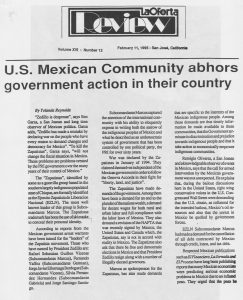February 11, 1995
By Yolanda ReynoIds

“Zedillo is desperate,” says Ben Garza, a San Josean and long-time observer of Mexican politics. Garza adds, “Zedillo has made a mistake by declaring war on the people who have every reason to demand changes and democracy for Mexico. To kill the Zapatistas,” Garza says, “will not change the fiscal situation in Mexico. Those problems are problems created by the PRI government over the many years of their control of Mexico”
The “Zapatistas,” identified by some as a guerrilla group based in the southern largely indigenous populated state of Chiapas, are formerly identified as the Ejército Zapatista de Liberación Nacional (EZLN). The most well-known leader of this group is Subcomandante Marcos. The Zapatistas trademark has been the use of ski masks to conceal their personal identity.
According to reports from the Mexican government, arrest warrants have been issued for the “leaders” of the Zapatista movement. Those who have named by President Zedillo are: Rafael Sebastian Guillén Vicente (Subcomandante Marcos), Fernando Yaffez (Subcomandante German), Jorge Javier Ellorreaga Berdegue (Subcomandante Vicente), Silvia Fernández Hernández (Subcomandante Gabriela) and Jorge Santiago Santiago.
Subcomandante Marcos captured the attention of the international community with his ability to eloquently express in writing both the sorrow of the indigenous peoples of Mexico and what he described as an undemocratic system of government that has been controlled by one political party, the PRI for over sixty years.
War was declared by the Zapatistas in January of 1994. They claimed themselves independent of the Mexican government in order to follow the Geneva Accords in their fight for “liberty, land, and justice.”
The Zapatistas have made demands of the government. Among them have been a demand for an end to the plunder of the nation’s wealth, a demand for decent wages for both rural and urban labor laws and full compliance with the labor laws of Mexico. They also demand a revision of the NAFTA that was recently signed by Mexico, the United States and Canada which, the Zapatistas say is not in accord with the reality in Mexico. The Zapatistas also ask that there be free and democratic elections in Mexico and that President Zedillo resign along with a number of illegally elected governors.

Marcos, as spokesperson for the Zapatistas, has also made demands that are specific to the interests of the Mexican indigenous people. Among these demands are that timely information be made available to these communities, that the Government terminate its discrimination and prejudice towards indigenous people and that it takes action to economically empower indigenous communities.
Remigio Olivares, a San Josean and a knowledgeable observer of events in Mexico, says that the call for armed intervention by the Mexican government was not unexpected. He explains that, during the bailout discussions here in the United States, right wing conservative voices in the U.S. Congress and Wall Street were demanding that the U.S. obtain, as collateral for the intended bailout, Mexico’s oil resources and also that the unrest in Mexico be quelled by government forces.
EZLN Subcomandante Marcos had made a demand for the cancellation of all debt contracted by Mexico through credit, loans, and tax debt.
Respected Mexican publications such as El Financiero, La Jornada and El Proceso have long been publishing reports that many Mexican economists were predicting serious economic problems in Mexico due to an inflated peso. They urged that the peso be devalued months ago many months before the Zapatistas uprising in Chiapas.
Ben Garza believes that the PRI leaders have again made a serious mistake and that what Zedillo has done is to create an urban guerrilla movement – the problems of the average person in Mexico are grave. The peso buys very little the minimum wage is just over 2.5 U.S. dollars per day. Yet many, if not most of the consumer products in Mexico have costs that equal and sometimes even exceed those of the same products in the United States.
Many observers of Mexican policy view Zedillo’s more with alarm and as evidence of the continued oppression and elimination of a segment of the community that has suffered great injustices since their conquest by the Spaniards over 500 years ago.
The action also poses serious problems for The United States, which counts on Mexico as one of its major trading partners for the purchase of American goods. There will also be increased attempts to immigrate from Mexico to the United States.
The States of Chiapas and Tabasco hold the largest unexploited sources of petroleum in Mexico. The extraction of oil that has taken place in parts of these two states has produced an environmental nightmare for the nearby communities, who have watched their sources of food and income killed by contamination.
In New York city, a major demonstration has been planned by the New York Committee for Democracy in Mexico for the Mexican Consulate in that city. Demonstrations are planned for the Bay Area but no specifics.
If you have concerns for the latest events in Mexico contact the Mexican consulate at 294-4323. Contact U.S. President Clinton at 202-456-1111. The New York Committee for Democracy in Mexico can be contacted at 212-6662. © La Oferta Newspaper.
